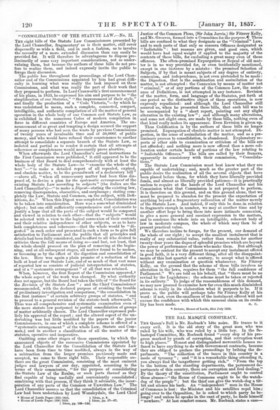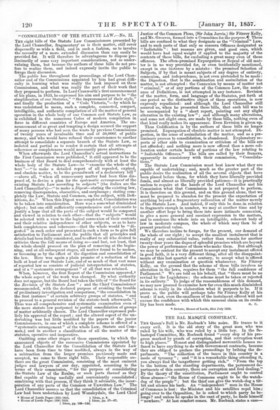THE BIL MASQUE CONSPIRACY.
THE Queen's Ball is Mr. Roebuck's bête noire. He traces to it every evil. It is the old story of the great man who was ruled by his wife, who was ruled by a little boy. In the Sebastopol Committee, Mr. Roebuck found "every step of his progress marked by proofs of corruption, and that corruption went to high places." Honest and distinguished mercantile houses refused to have anything to do with Government contracts, because they are obliged to preface the proceedings by bribing the departments. "The collection of the taxes in this country is a mode of tyranny " ; and "it is a remarkable thing attending it, you always find the taxg-atherer getting rich." "From the top to the bottom of the standing departments, the permanent departments of this country, there are corruption and foul dealing." By the theory of the constitution, Parliament ought to control these abuses—" the House of Commons ought to be the watchdog of the people " ; but the thief can give the watch-dog a titbit and silence hisbark. An " independent " man in the House of Commons is lost: the Minister and his satellites repel him; going over to the Opposition, he is asked to which party he belongs ? and unless he speaks in the cant of party, he finds himself "nowhere." At last comfort comes. Mr. Roebuck states a case- THE eight bills of the Statute Law Commissioners presented by the Lord Chancellor, fragmentary' as is their matter, still cover dispersedly so wide a field, and in such a fashion, as to involve the necessity of a more extended discussion than can easily be provided for. It will therefore be advantageous to dispose preliminarily of some very important considerations, not as undervaluing them, but because the authors of these bills do not profess to realize them, and indeed expressly invite the public to forego their discussion. The public has throughout the proceedings of the Lord Chancellor and of the Commissions appointed by him had great difficulty in learning what was really the task imposed on these Commissions, and what was really the part of their work that they proposed to perform. In Lord Cranworth's first announcement of his plans, in 1853, he expressed his aim and purpose to be "the siinplincation of our Statutes," "the improvement of their style," and finally the production of a "Code Victoria,"—by which he was understood to mean, such a complete connected, compact, intelligible, and authentic compilation of all the matter of general operation in the whole body of our Common and Statute Law, as is exhibited in the numerous Codes of modern compilation in force in different countries of Europe and America. The announcement of so great and tempting a design secured the support of many persons who had seen the waste by previous Commissions of twenty years of invaluable time and of 50,000/. of public money, and who would have refused their countenance to another attempt to consolidate a separate branch of the Statute Law' so isolated and partial as to render it certain that all attempts at coherence or completeness would necessarily prove abortive. When afterwards the Lord Chancellor's actual instructions to the First Commission were published,* it still appeared to be the business of that Board to deal comprehensively with at least the whole body of the Statute Law—to "examine the whole of the text "—" to make a detailed report of all repealed, expired, and obsolete matter, to be the groundwork of a declaratory bill" —above all, "when all unnecessary matter had been thus disposed of, to devise a plan for the systematic arrangement of the existing Statute Law according to subjects" (the italics are the Lord Chancellor's)—"to make a Digest—stating the existing law, removing discrepancies, obscurities, and surplusage ; stating completely the Law, Statute and Common, on the subject, with Definitions, &c." When this Digest was completed, Consolidation was to be taken into consideration. Here was a somewhat diminished object; but one still sufficiently comprehensive and systematic to justify a hope that all the parts of the subject would be compared and viewed in relation to each other—that the " subjects " would be selected with a view to the logical connexion of their contents and their relative independence of other subjects, so as to have both completeness and coherence—that the whole would be " digested " in such order and presented in such a form as to give full satisfaction to Parliament and the public that all principles and details had been fully considered, and to afford to all who desired to criticize them the full means of doing so—and last, not least, that the whole should proceed on the plan of removing at the beginning, and at all subsequent stages, all matter found to be useless, or becoming so by the effect of the digestion and consolidation of the law. Here was again a plain promise of a reduction of the bulk at least of our Statute Law, and of so much of that vast mass of reported law as consists of judicial interpretation of statutes, and of a "systematic arrangement" of all that was retained. When however, the first Report of the Commission appeared,t the whole aspect Of the work was changed. By what authority does not appear, but the Board had taken the title of "the Board for the Revision of the Statute Law" ; and the Chief Commissioner recommended, with the declared purpose of avoiding the trouble of preliminary investigation and comparison, "the consolidation in the first instance" of certain arbitrary groups of statutes, "and to proceed to a general revision of the statute-book afterwards."I Thus was all comprehensive and systematic examination even of the mere statute law postponed to partial consolidation of groups of matter arbitrarily chosen. The Lord Chancellor expressed publicly his approval of the report ; and the altered aspect of the undertaking was but little modified by the papers of the junior Commissioners, in one of which a complete scheme is offered of a "systematic arrangement" of the whole Law Statute and Common,§ and in another a classification of all the matter of the statutes, operative and inoperative.
Omitting some other stages of these operations, by which the announced objects of the successive Commissions appointed by the Lord Chancellor for the Consolidation of the Statute Law have been from time to time modified, always in the way of a subtraction from the larger promises previously made and accepted, we come to these eight bills. Their responsible authors are the great Commission_, consisting of the most eminent judges and lawyers of our day, appointed, according to the terms of their commission, "for the purpose of consolidating the Statute Law of the Realm, or such parts thereof as they find capable of being usefully and conveniently consolidated ; combining with that process, if they think it advisable, the incorporation of any parts of the Common or Unwritten Law." The Lord Chancellor assures us that the consolidation of the Criminal Law had been undertaken by Lord Wensleydale, the Lord Chief
• House of Lords Paper (393) 1853. Idem, p. 8.
+ House of Lords Paper (438) 1853. Idem, pp. 67-67. Idem, pp. 109-144. Justice of the Common Pleas, (Sir John Jervis,) Sir Fitzroy Kelly, and Mr. Greaves, formed into a Committee for the purpose.1 These bills are confined to what they designate as the "Criminal" Law, and to such parts of that only as concern Offences designated as "Indictable": : but reasons are given, and good ones, which would have had equal weight if applied to the majority of the contents of these bills, for excluding a great many even of these offences. The often-promised Expurgation or Repeal of old matter is in no way provided fort or even incidentally mentioned, except in one instance by a mistake : the promised Selection of Subjects, if by that is meant subjects of any degree of entirety, connexion, and independence, is not even pretended to be made : the Digestion, that is the combination and assimilation of the matter, is not attempted : the Connexion by means of matter not "criminal," or of any portions of the Common Law, the assistance of Definitions, is not attempted in any instance. Revision of the matter, form, and language of the Statutes put forth at one period as the distinctive object of these operations, is now expressly repudiated: and although the Lord Chancellor still assured us, when he presented these bills, that each bill was to be accompanied by a "short report, pointing out any slight alteration in the existing law" ; and although many alterations, and some not slight ones, are made by these bills, nothing even of that kind really makes its appearance. Even Revision is given up.
Thus Codification is by the authors of these bills no longer promised. Expurgation of obsolete matter is not attempted. Digestion, in the sense of assimilation of the matter, and as a preliminary process to consolidation, is abandoned. Explanatory reports or other aids to examination or criticism of the bills are not afforded ; and nothing more is now offered than a mere collocation under certain heads of portions of the law relating to "Indictable Offences." The bills are called by their framers, apparently in consistency with their commission, "Consolidations."
The Statute Law Commission must best know what they are capable of undertaking; and, much as the greater part of the public desire the realization of all the several objects that have been placed before them, for which they have liberally provided funds, and almost as liberally provided patience—it is practically useless to require at the hands of the Lord Chancellor and his Commission what that Commission is not prepared to perform. It is therefore on this ground, and on this ground alone, that we must be prepared to abandon for the present the expectation of anything beyond a fragmentary collocation of the matter merely of the Statute Law. And indeed, if only this be done in relation to fragments enough in number, we may at another time and by another effort hope to bring these into more intimate connexion, to give a more general and succinct expression to the matters, and to condense the whole into an intelligible, coherent body of law in moderate compass, the whole of which may then be of present practical value. We therefore incline to forego, for the present, our demand of the whole of our right ; to accept the smallest instalment that is really of any substantial value, rather than remain for another twenty-four years the dupes of splendid promises which are beyond the power of performance of those who make them. But although we may be content for the present to accept any instalment offered in good faith, it is a very different thing, after all the disappointments of this last quarter of a century, to accept what is offered without any examination or question whatsoever. Sir Fitzroy Kelly, on the ground that the scheme of these bills involves no alteration in the laws, requires for them "the full confidence of Parliament." We are told on his behalf, that "there must be no revisal by the Legislature ; the scheme must be taken or rejected in its entirety." To judge of the reasonableness of this demand, we may now proceed to examine how far even this much diminished scheme is rely in its elaboration what it purports to be. If it prove so the public will perhaps take Sir Fitzroy Kelly at his word : if not, even the smallness of the instalment offered will not excuse the confidence with which this unusual claim on its credu
lity has been made. • G. C.
11 Debate, House of Lords, 21st July 1856.














































 Previous page
Previous page